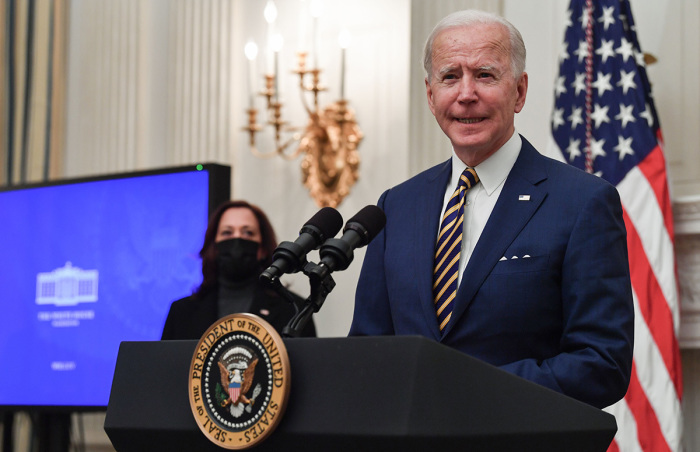Biden slams efforts to protect girls' sports in Pride Month proclamation

President Joe Biden issued a presidential proclamation in recognition of LGBT Pride Month, touting the large number of LGBT individuals who serve in his administration and slamming state laws that prohibit biological males from competing in girls' sports.
The proclamation, issued Tuesday, calls on Americans to “recognize the valuable contributions of LGBTQ+ individuals across America” and “reaffirm our commitment to standing in solidarity with LGBTQ+ Americans in their ongoing struggle against discrimination and injustice” throughout June, which he declared as Lesbian, Gay, Bisexual, Transgender and Queer Pride Month. He reported that “Nearly 14 percent of my 1,500 agency appointees identify as LGBTQ+.”
The president specifically highlighted Transportation Secretary Pete Buttigieg as “the first openly LGBTQ+ person to serve in the cabinet” and Assistant Health Secretary Dr. Rachel Levine as “the first openly transgender person to be confirmed by the Senate.”
While Buttigieg is the first openly gay cabinet member confirmed by the Senate, Richard Grenell, who briefly served as the acting director of National Intelligence during the final year of the Trump administration, was the first openly gay person to serve in a presidential cabinet, although he was never confirmed by the Senate for that position.
Biden lamented that “for all of our progress, there are still many states in which LGBTQ+ individuals lack protections for fundamental rights and dignity in hospitals, schools, public accommodations, and other spaces.” He specifically expressed concern that “some states have chosen to actively target transgender youth through discriminatory bills that defy our Nation’s values of inclusivity and freedom for all.”
While the president did not elaborate on the contents of the aforementioned “discriminatory bills,” he was likely talking about the efforts of states to require student-athletes to compete on sports teams that correspond to their birth sex as opposed to their chosen gender identity. Florida became the most recent state to enact such a law earlier this week, joining Alabama, Arkansas, Idaho, Mississippi, Montana, Tennessee and West Virginia.
“My administration is taking historic actions to finally deliver full equality for LGBTQ+ families,” he added. “On my first day in office, I signed an Executive Order charging federal agencies to fully enforce all federal laws that prohibit discrimination on the basis of gender identity or sexual orientation. As a result, the federal government has taken steps to prevent discrimination against LGBTQ+ people in employment, health care, housing, lending, and education.”
After mentioning his executive order allowing transgenders to serve openly in the U.S. military, Biden asserted that “LGBTQ+ rights are human rights, which is why my administration has reaffirmed America’s commitment to supporting those on the front lines of the equality and democracy movements around the world, often at great risk.” According to the president, “We see you, we support you, and we are inspired by your courage to accept nothing less than full equality.”
Additionally, Biden vowed that “I will not rest until full equality for LGBTQ+ Americans is finally achieved and codified into law.” He urged Congress to pass the Equality Act, a wide-reaching legislative package that Democrats argue is necessary to enshrine nondiscrimination protections against the LGBT community into federal law.
Critics of the legislation argue that the Equality Act’s prohibition against discrimination on the basis of sexual orientation and gender identity will require schools to allow boys who identify as females to compete in women’s sports despite the inherent physiological advantage males enjoy over females in athletics. The U.S. House of Representatives has already passed the Equality Act, but opposition from both Democrats and Republicans has prevented it from passing in the Senate.
“During LGBTQ+ Pride Month, we recognize the resilience and determination of the many individuals who are fighting to live freely and authentically,” he concluded. “In doing so, they are opening hearts and minds, and laying the foundation for a more just and equitable America. This Pride Month, we affirm our obligation to uphold the dignity of all people, and to dedicate ourselves to protecting the most vulnerable among us.”
Biden also asked the American people to “recognize the achievements of the LGBTQ+ community, to celebrate the great diversity of the American people, and to wave their flags of pride high.” In recognition of Pride Month, the U.S. Embassy to the Vatican is flying the rainbow flag despite the Catholic Church’s opposition to same-sex marriage.
In response to criticism over the government’s endorsement of a political movement, Rep. Nicole Malliotakis, R-N.Y., has introduced the Stars and Stripes Act, which would limit the flags that can be flown at diplomatic or consular posts to the American flag, the flag of the country where the post is located, the flag of a particular state or territory in the U.S., a “departmental or secretarial flag,” the flag of an Armed Force, or “a flag designed to honor persons who are classified as prisoners of war or missing-in-action.”
In addition to outlining his administration’s vision on LGBT issues, Biden’s presidential proclamation highlights the history of LGBT activism in the United States, from the Stonewall riots of 1969 that he argued “sparked a liberation movement” to the legalization of same-sex marriage in 2015.
Ryan Foley is a reporter for The Christian Post. He can be reached at: ryan.foley@christianpost.com




























